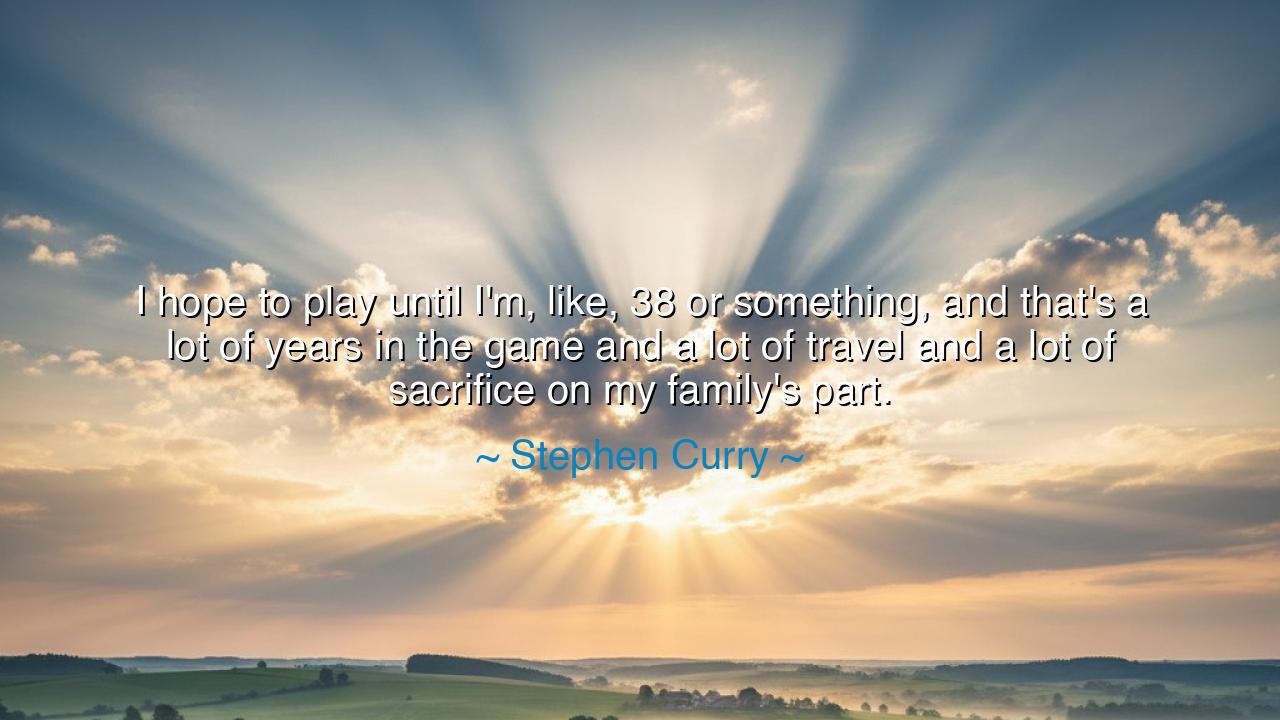
I hope to play until I'm, like, 38 or something, and that's a
I hope to play until I'm, like, 38 or something, and that's a lot of years in the game and a lot of travel and a lot of sacrifice on my family's part.






Hear the words of Stephen Curry, who declared: “I hope to play until I'm, like, 38 or something, and that's a lot of years in the game and a lot of travel and a lot of sacrifice on my family's part.” This is not merely the voice of an athlete speaking of the end of his career. It is the voice of a man who knows that greatness demands not only his labor, but the unseen labor of those who walk beside him. His words reveal the weight of devotion, the passing of years, and the hidden price of glory.
The game is not only the court of basketball—it is the arena of life. To remain in it for so many years is to withstand the strain of time, the wear of the body, and the fire of competition. Few endure so long; fewer still endure with excellence. Yet Curry’s words remind us that endurance itself is not born from the self alone. For behind every man who stands in the light, there are others who stand in the shadows, bearing the burden with him.
The travel he speaks of is more than the miles between cities. It is the distance from home, from the laughter of children, from the quiet evenings by the hearth. The road is both teacher and thief: it gives glory but takes away moments that can never return. To choose such a life is to embrace both triumph and absence. And so the champion carries not only his own burden, but the silent sacrifices of those who wait for his return.
This truth was known even in the days of old. Consider Marcus Aurelius, the Roman emperor and Stoic philosopher. He marched with his armies to distant frontiers, ruling an empire while enduring cold, hunger, and endless war. Yet in his meditations he often spoke of duty’s toll upon his family and his longing for the peace of home. Like Curry, he understood that the pursuit of greatness demands more than the labor of one man—it requires the patience and sacrifice of all who are bound to him by love.
The sacrifice of family is the hidden pillar of every enduring success. The crowd sees the victories, the trophies, the records broken. But unseen are the children who miss a father’s embrace, the spouse who holds together the home, the parents who gave up their rest to raise the dreamer. Curry’s words are an acknowledgment, a bow of humility toward those who share in his journey. It is a reminder that no crown is won by one head alone.
The meaning, then, is not only about basketball, but about the balance of ambition and sacrifice. To reach far, one must give much—and often it is the family that gives with you. This is not cause for despair, but for reverence. For if the dream is shared, then the sacrifice, though heavy, becomes sacred. The path to greatness is not walked alone, but as a procession of souls, each bearing part of the burden.
Let this be the lesson: if you strive for greatness, honor those who strive with you, even in silence. Do not take their sacrifice for granted. Speak gratitude, live with humility, and give back as you are able. If the road takes you from them, ensure that your love never does. And when your season ends, return to them not as a stranger, but as one who remembers the price they paid.
Therefore, children of tomorrow, learn from Stephen Curry’s words: chase your calling with fire, endure with patience, and recognize always the unseen sacrifices of love. For a man may win championships, but his true greatness is measured not only by the years in the game, but by the honor he gives to those who made it possible.






AAdministratorAdministrator
Welcome, honored guests. Please leave a comment, we will respond soon